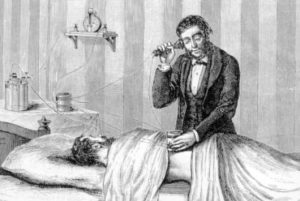
The Invalid, circa 1870, by Louis Lang is Highly Idealized
Most people today don’t enjoy staying in hospitals, and this was doubly true for people in the 1800s. Doctors were not held in high esteem, and neither medical knowledge nor the primitive equipment/technology available were particularly reassuring. Well into the early 1900s, many ordinary people considered hospitals more a place to die than a place to recover.
Instead, home care was the norm, and hospitals were often seen as a last resort for patients without family and friends to care for them. (This is a general statement, of course, and certainly people did go to hospitals with excellent outcomes.) Rather than relying on professional staff, most families expected mothers, sisters, and wives to “nurse” anyone in the family who was ill. Between a doctor’s visit, a few herbs and traditional concoctions, and a consultation with a home medical manual, most families coped well enough with the situations that came their way.

Dr. Thomas Riddle in the 1920s
Mental health care was different. No one–including doctors–really understood it or knew how to treat it. Consequently, the mentally ill were often neglected. Some families were ashamed of their sick relative and hid him or her away in the traditional attic described in many a melodramatic tale. Other families beat or starved their insane members out of ignorance or exasperation, or turned them out entirely if their behavior became too difficult to handle. Actually treating mental illness with a hope for recovery was nearly impossible in the home.

A Doctor Checking on a Patient, 1800s
As medical knowledge increased, the idea of “hospitals for the insane” became more acceptable. This blog and the book I’m working on will give information about the early years of psychiatry and its most visible symbol: the insane asylum.